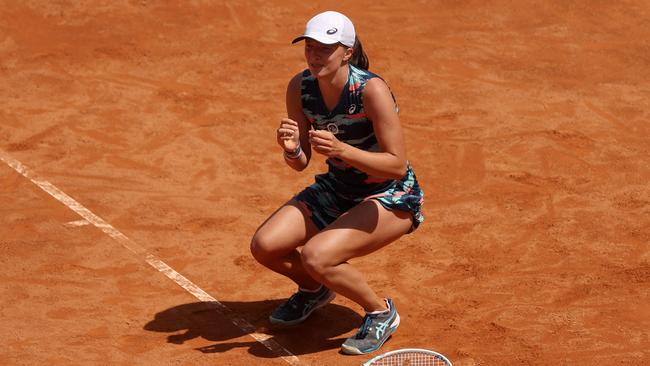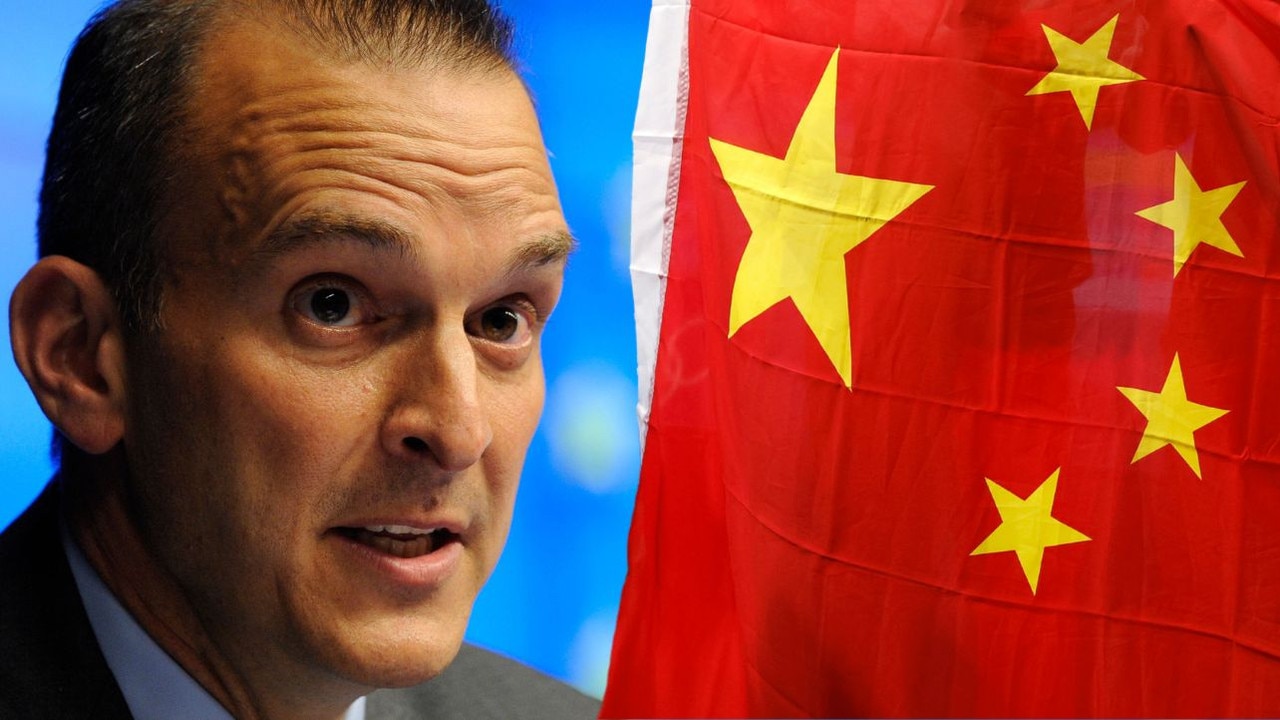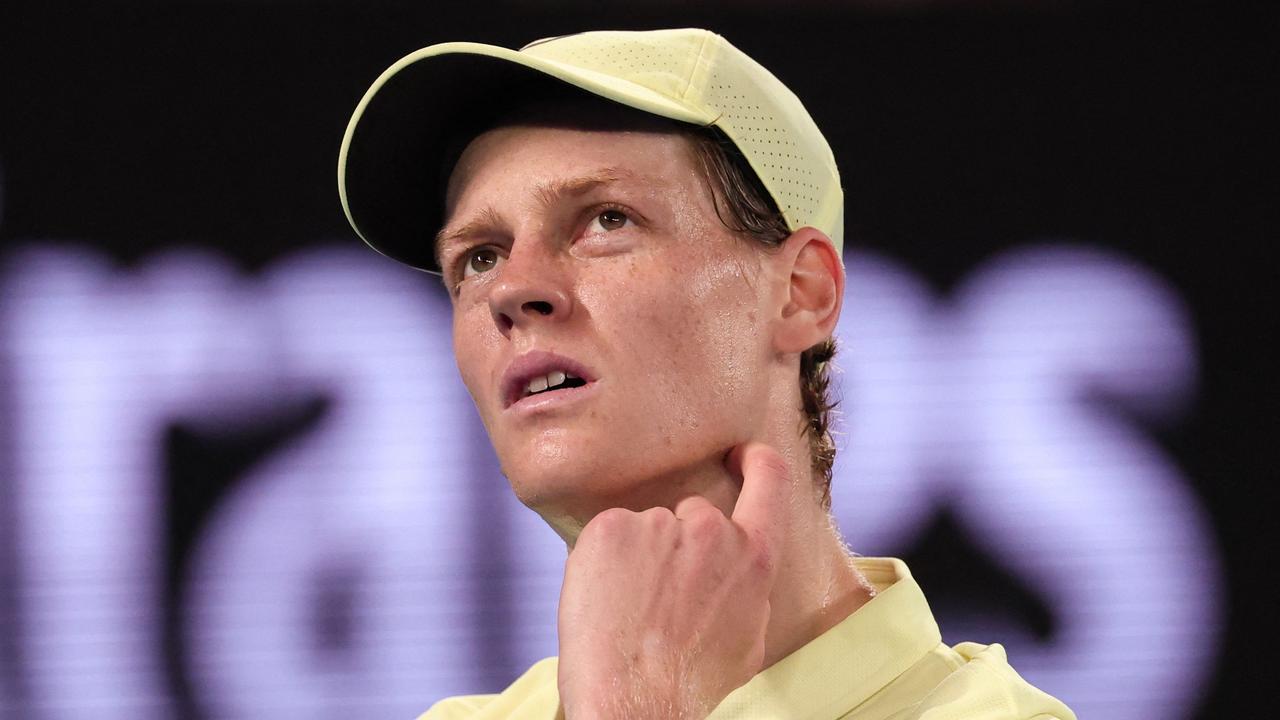Why new world No.1 Iga Swiatek cried for Ash Barty
Iga Swiatek was saddened by Ash Barty’s retirement – then took her place as the World No. 1 ahead of this week’s French Open. She hasn’t lost a match since Barty quit.

Iga Swiatek cried for 40 minutes when Ash Barty retired. Cried for the departure of a good soul and then cried for herself as the new World No.1.
All the pressure and spotlight and attention and expectation that Barty was running a mile from … it was all to be lumped on Swiatek. She’s hardly crumbled under the strain.
The hustling, bustling, fist-pumping 20-year-old Pole with the ping-pong forehand and the quickest feet since Ginger Rogers hasn’t lost a match since Barty called it quits.
She enters this week’s French Open on a three-month, five-tournament, 28-match winning streak through Doha, Indian Wells, Miami, Stuttgart and Rome.
Asked how long she can remain unbeaten, the bright young spark replies: “Good question. I think nobody knows.”
Swiatek was ambushed by American Danielle Collins in the semi-finals of the Australian Open. In hindsight, what a strange old result that was.
The real winner of Swiatek versus Collins was Barty, who was always going to have the American covered in what became the final match of a career that came and went faster than a stolen kiss. It might have been a different story for Barty against Swiatek, who’s since stolen her crown/jumped in her grave to become the fresh new face of the women’s tour and the unbackable favourite for Roland Garros.
Swiatek was the most emotional of Barty’s peers when the Wimbledon champion cashed in her chips. “I was crying for 40 minutes,” she told BBC Sport at the time. “Mainly it was because of Ash’s retirement. I didn’t know it was going to happen and it really surprised me.
“I always had this vision that we would all play until we are 35 or something. Until our bodies are so tired that we can’t any more. I needed time to actually understand what she must have thought. Her decision was really brave and I felt a lot of emotions because of that – and then I also felt emotional because of my own position.”
Swiatek became Poland’s first World No.1 when she smoked Naomi Osaka in the final of the Miami Masters in March. After winning the recent Madrid final, she said of Barty: “Honestly, yes, it would be much, much harder with her on tour to win matches and tournaments.
“When she retired, I had the strong belief that she has the best tennis on tour. She was the one I really looked up to. She gave me a lot of motivation to, like, analyse my game and make it even better.
“For sure it would be harder, but there are reasons why she decided to stop. I think it’s kind of – I mean, it’s her decision. I completely understand the amount of pressure that is there. She was World No. 1 for such a long time. She has won many things that she can feel satisfied.
“It’s totally up to her if she’s going to play or not. I miss her on tour because I loved watching her play and how she was always mentally stronger than her opponents. I mean, what else can I say?”
Swiatek’s hot streak has been emphatic. She’s lost one set in her past 20 matches. Scoreboards have been lopsided. In the final of Doha, she beat World No.7 Anett Kontaveit 6-2, 6-0. In the final of Indian Wells, she beat World No.6 Maria Sakkari 6-4, 6-1. In the final of Miami, she beat Osaka 6-4, 6-0. She played two Billie Jean King Cup qualifiers for Poland in April, winning them 6-1, 6-0, 6-0, 6-0. In the final of Stuttgart, she beat World No.4 Aryna Sabalenka 6-2, 6-2. In the final of Rome, she beat World No.7 Ons Jabeur 6-2, 6-2. She reacted with unusual emotion for a regular WTA event, falling to her knees, placing her face in her hands and sobbing.
“All these tournaments that I‘ve won seem pretty surreal right now,” she said. “I feel like just continuing the same things that I did before really was the key to that. It’s pretty weird because you may think every tournament it will take, I don’t know, something more. But I’m pretty happy with my solid game.
“I was able to just play good and improve during the tournament. I’m just proud of myself. That’s the only way I can describe it. I felt huge relief. Ons played pretty smart. I wanted to be even smarter. It got to be a really physical game.
“At the end I was pretty tired. I’m just really happy that I could cope with all the pressure and expectations so well. Because of that, I had this reaction.”
The beauty of a winning streak is that you’ve nearly forgotten how to lose. The fear is that you’re about to remember.“It‘s not something you can get used to. Every match is tough,” Swiatek said.
“Even though it may seem easy, it’s never easy. It’s always a lot of pressure. Always a lot of preparation. The minute we finish the match before, the next one is already starting in our heads. It’s pretty tough.
“Yes, I have emotional reactions, but the one in Rome was probably the most emotional after winning the title. I mean, why not? It’s like a week of tension and stress and you finally get to let go of it. For me it’s OK.”
Swiatek needs to extend her unbroken run to 35 matches to win the French. “For sure it‘s going to be a little bit harder with all the breaks that we’re going to have between matches, but I also like the rhythm that we have in grand slams,” she said.
“Again, I’m going to try to do step by step, just think of the next match as I did at these tournaments. If I’m going to treat it as any other tournament, I think it’s going to be fine.
“I have accepted a few things. It’s easier for me right now to overanalyse stuff. I already know that I did some great stuff this season. I feel like I can play freely and not think I have to win tournaments or matches or save some ranking points.
“This year, the pressure that I always put on myself, it’s a little bit lower. The expectations around me are higher, but I’ve never had a problem to cut it off and not think about it. I’m gaining experience at that. I think with more and more tournaments, it’s going to get better and better for me to cope with all of that.”
Most WTA competitors wore blue and yellow ribbons in support of Ukraine when the war against Russia began. The ribbons were few and far between at Rome. Swiatek was one of the few to still be wearing hers and it will remain in place on her cap or shirt at Roland Garros.
“I know that many players played with ribbons at the beginning of the war when all the fuss was a little bit more loud,” she said. “I realised that some of them took them off, which is for me pretty weird, because there is still war. There are people still suffering.
“I’m going to wear it until the situation is going to get better. I don’t get how – I mean, I get it. It’s how media works. How it fusses up then goes a little bit down. But hopefully players are going to be more supportive.”
Swiatek was born in Warsaw but now calls the village of Raszyn home. She’s rarely been there since the attack on Ukraine. “My family is doing fine but for sure the war is affecting Poland a little bit more than some other countries,” she said.
“It‘s something that I can’t experience with them because I’m travelling all around Europe. I was in the US for a long time when the war started. I know it’s tough and I know Polish people are supporting. I’m also going to support soon and do an initiative that is going to change something, hopefully. That’s my goal. I know I’ve been talking about it for a long time, but I can make it official right now. I for sure want to show my support to Ukrainian people, as every Polish person is doing at home.”
Swiatek’s first-round opponent at Indian Wells was Ukraine’s Anhelina Kalinina. Before their match, Swiatek said: “For me the most important thing is using my voice. I’m only 20, so I’m not an expert and I don’t know how to fight war.
“But for sure I want sport to connect people and bring a little bit of joy. I want for all the players to have a kind of similar voice so we can fight this together. We’re kind of popular and we have some influence on the people in our countries, so why not use that?
“I’m pretty proud of the Polish people who are welcoming Ukrainians. I could see that when I was in Poland. More than 1 million Ukrainians have crossed the border already. I’m really proud that we are helping. It’s great that athletes are uniting. Most of us have spoken out against the war and I think we can use our voices in a proper way.”
Barty used to play a straight bat to questions about politics. Swiatek is more interested in taking a swing.



